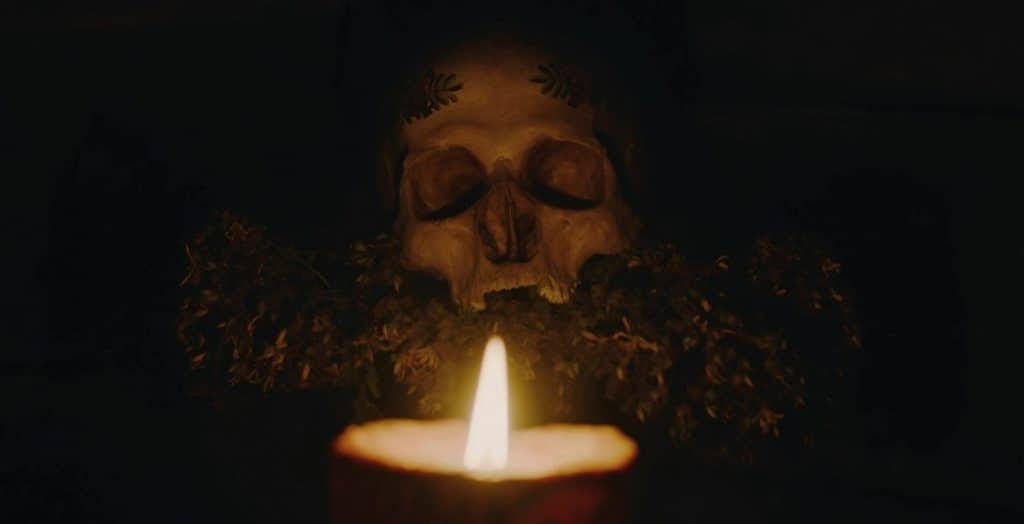
The phenomenon of ‘folk horror’ has been with us for some considerable time – you might argue for as long as storytelling has existed – but, at least in terms of folk horror cinema, there does seem to have been a real explosion of interest in the last decade or so. This has found expression in a spate of books, articles and other more academic pursuits, as well as in newer filmmaking, which perhaps has a sense of continuing this tradition. There’s even a certain amount of ubiquity to it all now, as interesting an area as it is. The documentary Woodlands Dark and Days Bewitched: a History of Folk Horror has set itself the mammoth task of looking at all of this – fandom and analysis – via looking mainly at film and TV. As you might imagine, there’s an awful lot to consider, and this is borne out by the sheer length of this film: at well over three hours, it’s not a casual sit-down watch, and its running time is its greatest sticking-point. Still, there’s no doubt that this is a love letter to an expansive, important and enduringly creepy genre, with plenty of care and attention shown throughout.
The first ninety minutes or thereabouts is the tightest section of the film: with a well-selected opening montage of scenes, it is quick to posit something which seems fairly well accepted, that folk horror represents the ‘return of the repressed’, with old ways and practices finding their way to the fore. As such, it has a clear shape and sense of direction at the start. It also offers a useful history of the term ‘folk horror’ itself, which is great, with lots of old newspaper articles and such which had likely been unseen by most people up until this point (reviewer very much included). The film then moves in a largely chronological way through the heyday of British folk horror cinema and the ‘trinity’ of films usually agreed on as seminal. It lingers on, for example, The Blood on Satan’s Claw and its nihilistic, jagged anxieties about sexuality and belief, offering interesting context from 1970s Britain and suggesting how contemporary events could have fed into the horrors being imagined.

Heading back in time to look at examples of both British literature and television, the film offers up a theme to which it returns several times: the importance of the land itself to folk horror. From here, it spreads its net ever wider, and begins to do what it does a great deal thereafter: reference a number of titles which are not widely known. There are simply scores of films, not just from the English-speaking world but elsewhere, and so many clips that these begin to feel a little overwhelming, even though the commentators always do a good job at suggesting reasons for their inclusion. The film goes on to walk us through sections on witchcraft, American folk horror, and finally, folk horror around the world. By this last section, which seems to operate as a catch-all for any other intriguing clips and themes which had or hadn’t been included yet, it begins to feel like a series of diminishing returns, causing a kind of snow-blindness to all the slinking witches and shadowy rituals. You can have too much of a good thing.
Woodlands Dark and Days Bewitched certainly has an impressive roster, with Lynda Hayden and Ian Ogilvy on board for poetry reading (!) as well as a serious array of talking heads, going beyond just the usual suspects – taking in, for example, Geraldine Beskin, proprietor of the Atlantis Bookshop; Alice Lowe, Pete Tombs and Jeremy Dyson. Other speakers are other authors, directors, actors and presenters, and amongst these, writer Jonathan Rigby comes across as particularly listenable and knowledgeable, with a knack of conveying what he has to say in a very straightforward manner. The film’s director, Kier-La Janisse, also appears in the film as well as providing some voiceover in places, though the film keeps this to a minimum and usually lets the footage speak for itself.
The film is undeniably well made, not just busy with clips and commentary, but also collage and animation sequences, plus a great use of fitting dark folk music and recitation to add some texture to proceedings. It’s chaptered, but in this case, this absolutely has a purpose; you could suggest that, particularly once you get to the catch-all Chapter 7, this may have worked better as a standalone documentary with more of a shape and sense of direction, and this approach could have worked as well in other parts of the film, too. But, as it stands, these are useful points to pause and really do mark a shift in focus.
Whilst a late claim that folk horror’s appeal stems from its links to what cannot be analysed – given we have three hours of the analysis of folk horror here – might just raise an eyebrow, there’s a lot to admire and enjoy. If nothing else, you will come away with a whole list of obscure films to seek out. Given the amount that’s gone into this film, it’s difficult to call it anything but definitive, all told.
Woodland Dark and Days Bewitched premiers on Shudder on Monday, January 10th 2022.
